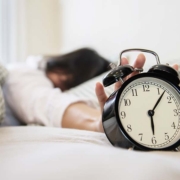A Long Sleep is No Match for A Good Sleep ~ A Brief Discussion on Deep Sleep
As the knowledge of sleep science becomes more well known, everyone knows that the body needs at least 7 ~ 8 hours of sleep every night. Adequate sleep reduces the chances of many physiological illnesses and psychological disorders from happening, such as depression or the three hypers, and can even drastically lower the chances of suffering from neurodegenerative diseases in old age. In other words, sleep just brings a plethora of benefits. However, plenty of people said that they still feel extremely tired in the morning or are still having trouble getting up even when they did get eight hours of sleep, and why is that? Well, the problem may lie in your deep sleep.
What is deep sleep?
To put it in simple terms, deep sleep is a part of the sleep cycle. This is the time when both the brain and the body fall into low activity status. If you are using smart bracelet or sleep detection APPs, you will discover that your RHR, your BPM, and your EEG have all dropped down to the bare minimum during deep sleep, as this is the time when your body is concentrating on secreting growth hormones, repairing tissues and cells, as well as helping your muscles and bone grow. On the psychological aspect, deep sleep assists with the stabilization of your emotions, in addition to releasing all the negative energy within your body.
Sleep at this stage is also called “slow-wave sleep” (α brainwave). Although the brain is still active, the senses of our body perceive the least stimulation from the outside world and we won’t be woken up that easily. At this point, the body is in the repair mode, eliminating all the stress received throughout the day. The toxic wastes that our brain has accumulated throughout the day are also most efficiently removed during this precious repairing period. The anesthetics used during operations will allow the patient go directly into deep sleep, so deep sleep is also the sleep stage that is the hardest to wake a person up from. A regular person will have the hardest time waking up from deep sleep. If you are forcibly woken up from deep sleep, you will feel quite dizzy. Judging from an 8-hour sleep time perspective, deep sleep usually occupies a longer period of time for young people, at approximately 20~25% of the entire sleep time. Deep sleep will occupy less and less time as the age of a person increases, which is why older individuals are more prone to be suffering from inadequate sleeping quality.
If one does not acquire enough deep sleep, the body and the brain will not attain sufficient time to repair and cleanse itself. Therefore, it’s natural for one to wake up still feeling extremely tired and stressed. So how does one maintain sufficient deep sleep? Experts have this to say:
Fixed Sleep Time
Develop a regular routine and never stay up late. Strive towards going to bed before 11 o’clock every night, and sleep for 6~9 hours to increase time for deep sleep, thereby allowing the body to have ample time to secrete hormones to repair body tissues while also replenish the body and nourish the spirit.
Relax the Body Before Going to Sleep
Take a hot bath or a foot bath before going to sleep can facilitate blood circulation in the body, in addition to helping the body relax so that one falls asleep easier. Research has shown that the effect of the hot bath can relax the body and in turn increases time in deep sleep, which aids in the removal of stress and pressure accumulated throughout the day.
Don’t Use Any Electronic Products Before Going to Sleep
A lot of people will use their electronic products before they go to sleep, whether it’s taking care of work matters, scrolling through social media pages, watching shows, or playing games, all of which will stimulate brainwaves. The blue light emitted by electronic products will also stimulate the brain and suppress melatonin, which causes people not want to go to sleep.
Avoid Consumption of Stimulating Foods
Do not drink alcoholic beverages or products which contains caffeine (tea, coffee), which will stimulate the brain and lead to being too stimulated to sleep. Additionally, do not eat spicy foods or foods with a heavy taste as a midnight snack. When hungry, you can consumer hot milk or boiled eggs, which all aids in sleep. Furthermore, it is not ideal to drink water before you go to sleep, as too much water would cause bathroom break(s) in the middle of the night.
Adequate Amounts of Exercise
Research has proven that adequate amounts of exercise during the day increases the duration of deep sleep at night. Additionally, avoid being overweight, as it also affects the quality of sleep. Practice of yoga or other forms of stretching exercises is recommended prior to sleep, as it puts the body in a relaxed state and thereby allowing you to sleep better, falling into deep sleep at a faster rate.
Hope that everyone can adopt the aforementioned tips and be aware of the items you should avoid doing, thereby increasing the duration of deep sleep as well as enhancing sleep quality, feeling energetic and refreshed all day, every day!

